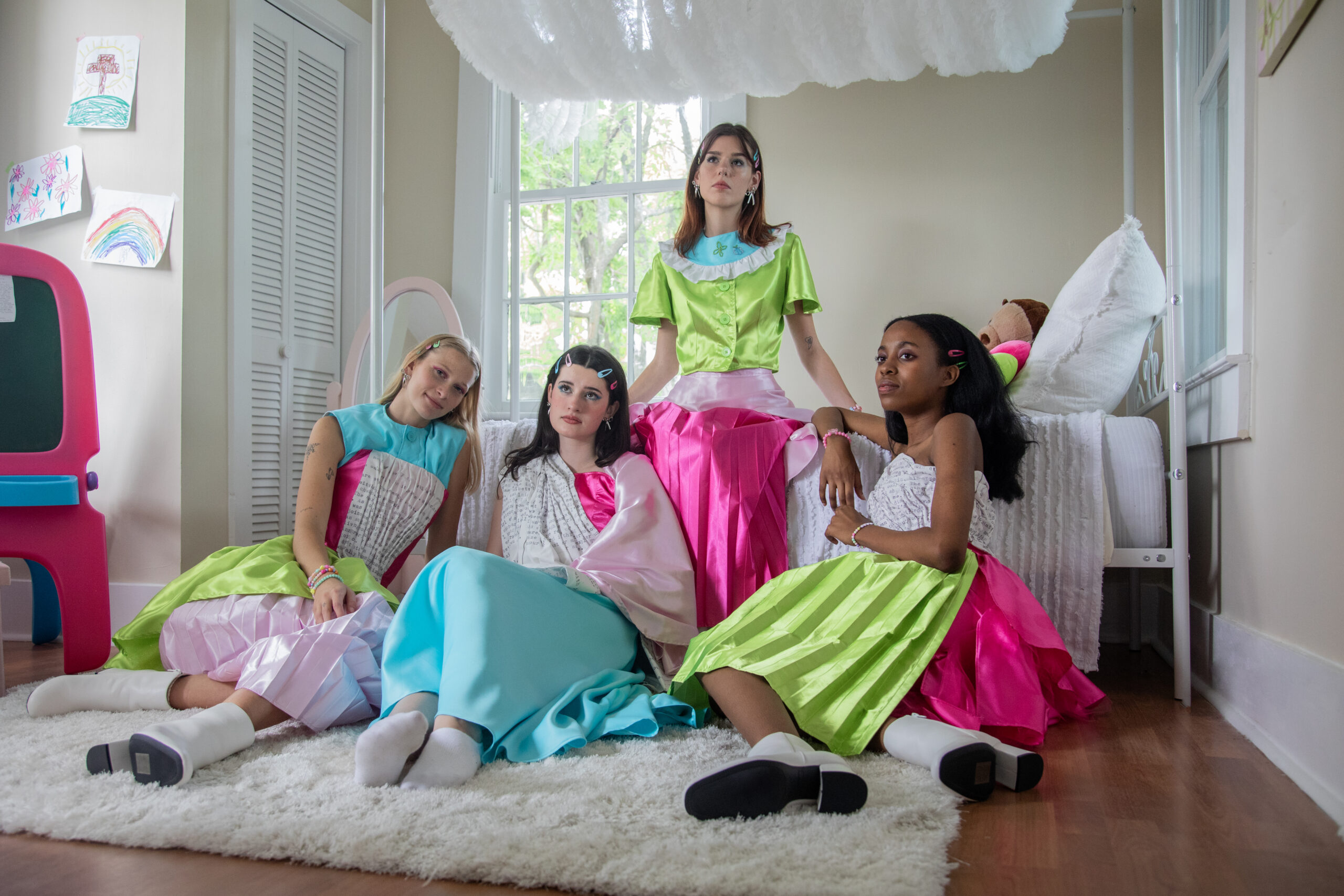During jury weekend for SCAD’s fashion design seniors, in which they present their collections to industry judges who select the final list of students for the runway show, one collection in particular caught my eye. This collection was bright, colorful, and playful, but upon a closer look, I found it to be centered around a very dark and tragic experience. Jill Stockard’s “When I Was Six” explores her experience of sexual assault at age six and the healing journey that unfolded in the years following. I had the honor of sitting down with her a few weeks later to learn more about her process, experience, and goals for the future.
Flora Medina: Can you start by telling me a little bit about the inspiration behind your collection?
Jill Stockard: I honestly was kind of lost in the beginning doing our summer sketchbooks, you know. We had to have three different sketchbooks. So I had the first two ideas, and then for the third, I had shouted out a while ago like, “Oh, sexual assault.” You know, it’s been on my mind for 17 years. But I wasn’t completely sure I wanted to do that. Then, I was rummaging around when I was back up north over the summer and just found a collection of all of my childhood memorabilia, like pictures and drawings that I did. And I kind of just settled on, you know, a lot of this stuff has meaning in this box, but the most meaningful thing is what happened during my childhood. So, I settled on that.
Medina: What was your process for translating that experience into your sketchbooks and your designs and, ultimately, the garments themselves?
Stockard: That was something that I thought I’d be really bad at. And I’ve done so many projects, but nothing as powerful as this. So, that’s something that I struggled with at the beginning of the year. But on the first day of class, we had to present our sketchbooks to our senior class. So, I decided to type up a letter on my typewriter. I just thought, “I want my typewriter.” It was important to me, and it just felt right. So, I took my silly little typewriter out, typed up my letter, and I felt that was the best way that I could translate that to my class. And then, I ended up using that letter in print on my collection, throughout my collection.
Medina: Very cool. So, with the collection being about sexual assault and your own experience, was this experience something that you had been vocal about before and that you talked about pretty openly, or was this your first time really speaking up about it?
Stockard: This was my first time talking about it, and I was really nervous at first because I wasn’t sure the reaction I was gonna get. I talked with my professor, Ellen Fowles, over the summer. I love her. And I just kind of said, “I don’t want to offend anybody.” I know it’s a really deep and dark topic, and it’s not talked about very much. And she kind of helped me understand, regardless of what I say, it’s about me–and it’s my story. And it’s not offending anyone because everyone will understand. So, that was really helpful. And it kind of just made the whole process easier, knowing that I have everyone, all my peers, on my side.
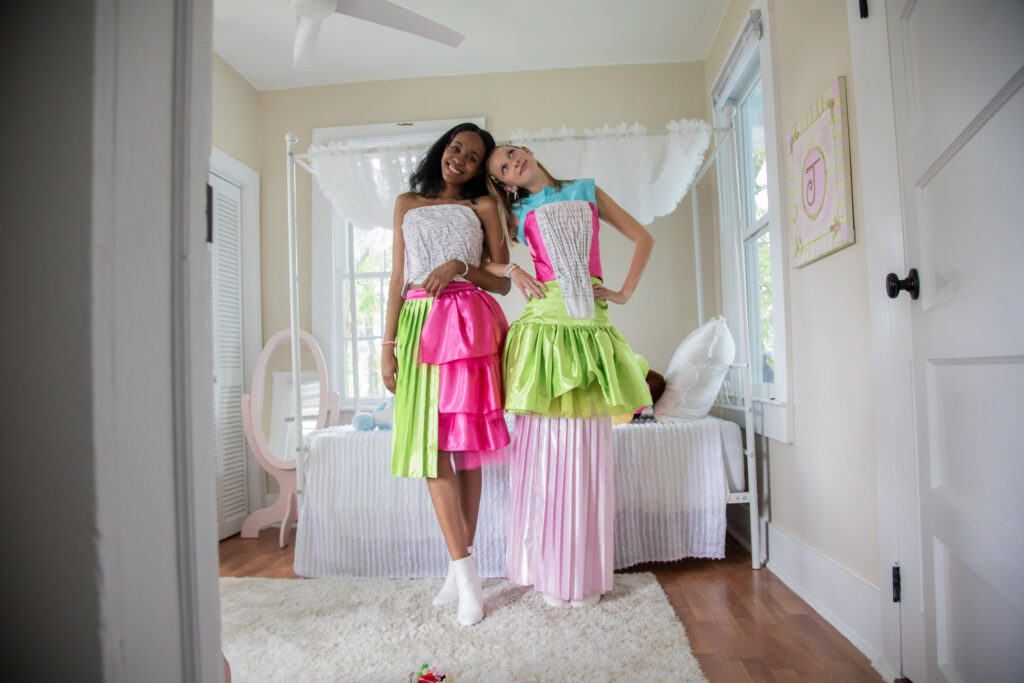
Medina: Throughout the year, you present in critiques, not just to your class but to industry mentors, to other professors, and then, at the end of all of that, you go through the jury process where you present to a much wider audience of people from the industry, who aren’t familiar with your work. What was that process like, really opening up continuously about this experience?
Stockard: I would say, overall, it was a bit hard at first, but doing it multiple times–we had five different critiques and then jury–the first five were, well, it honestly started out a little rough. I didn’t really know how to explain it at first, but as the year went on, I got better and better at it. By the fifth critique, I had different mentors surrounding my table after I set up. Before I even started, and just from the looks of it, they were like, “Wow, this is so cute,” and, “I love this.” And I was thinking, “Just wait until I get into it!” But that was kind of a joy of it. I don’t know if I should say a joy, I guess. One strong part of it was that I was able to pull that reaction from my audience and from all the mentors and faculty. When I got to jury, I’m sure very few have done this, but I actually made a juror tear up. So that was really powerful, knowing that my collection had done something that had made people feel an emotion that I had been feeling for the past 17 years. It was a very powerful moment for me, and I felt really good about it.
Medina: Totally. Congratulations. I think that touched on something that I found really impactful about your collection, which was that the topic itself that inspired it is something that’s awful. But the collection itself is so joyful and fun and playful. Can you talk a little bit about your decision to focus on that or to make it seem more joyful?
Stockard: Again, Professor Ellen also had something to do with that. I first started very dark, but she kind of mentioned that having just red and black in your color scheme, you know, it’s been done. So I kind of thought, “Well, what if I involve more of my personality, rather than just my story?” And I have a very bright and bubbly personality, so I thought that would be perfect because the whole point of the collection was that you’re seeing it from a distance. And it looks so overwhelming, and I want to draw my audience towards it. They’re like, “Why is it so colorful? Why is it so hard to look at sometimes?” They look closer, they get the story, and they realize, “Oh, because it has a lot of meaning.” And it’s not supposed to look scary because I don’t want to scare people off. I want them to be able to look at it and really sympathize or empathize. But I don’t want to have people fear my collection. I want them to embrace it, so that it’s easier to talk about because it’s always been such a hard topic to discuss. I just felt like that was the best way that I could do that, to put my own bit of personality in it because it was just so personal to me.
Medina: I think it paid off because your personality is definitely evident in the collection itself. I think it’s so powerful to have that sort of angle with it. I think it’s a topic that’s so hard to talk about for anyone who’s experienced it, but just in general, I feel like no one really talks about it. And that always seems so crazy to me because it’s something that even if you don’t know it, most of us probably know someone who experienced that or something similar. I think making it so that it feels like more of an approachable topic of conversation was really, very impactful. So, you spent the last year working on this collection, and you also produced a photoshoot and film to support it. What throughout this process are you most proud of?
Stockard: I would just have to say my words have been most impactful. It’s one thing to create a collection, but it’s another to be able to talk about it. And it’s been really eye opening for me and my mental health. The fact that I stood up, and I was able to say something and the whole point–there’s multiple points of this collection–but the point was to finally be able to talk about something that I know a lot of people struggle with, as you said, because every day there’s a couple thousand Americans, at least, that are sexually assaulted. And every nine minutes, one of those people is a child. You wouldn’t have known about that if I didn’t just say it just now. So, I wanted it to be very vocal. I felt that my senior year was my time to speak up about it. I think that was definitely the best part, my favorite part. Just being able to talk, being able to speak up about it.
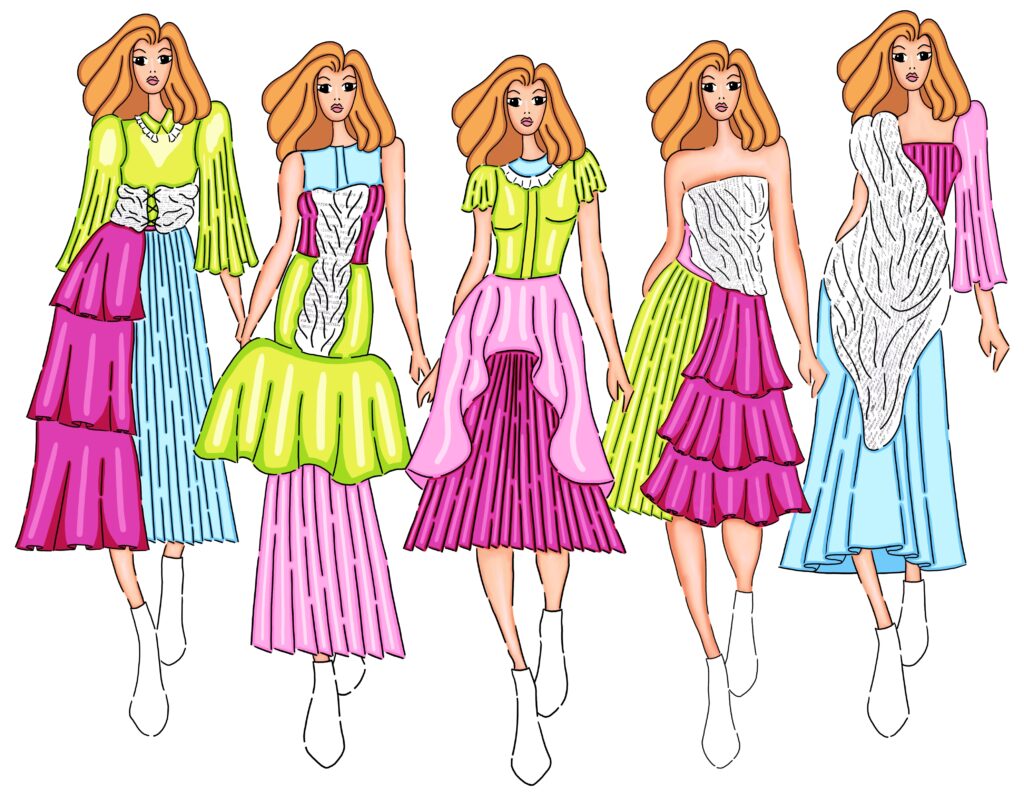
Medina: That’s awesome. Since this was your first time really opening up about it, what did this process do for you? Or what did you take out of this, from a mental health or healing perspective?
Stockard: That’s a tough one. I guess it just kind of made me focus there and understand that I do need to take more time for myself mentally. My work has always been important to me, but this has been a topic that being here at SCAD, in my senior year, it’s a lot. Me and all of my peers are so very busy with our collections that we don’t really have time for ourselves. And then on top of that, not having time for my mental health because of the topic that I chose is also very hard. So, I just want to be able to focus more on my mental health.
Medina: I think that’s a very good conclusion to come to. Especially, as you said, I think the senior process, regardless of your topic that you choose, is grueling. Especially when you’re doing something as heavy and significant as what you did. I can definitely imagine that that would take a toll on you.
Stockard: Yeah, it’s physically exhausting. And it was mentally exhausting for me, especially.
Medina: What were some tools or resources that you used to help get through that process?
Stockard: Honestly, music was a huge part of it. Whether it was meditation music, where I could just forget–I’d lay in bed at night and just forget about it–or I tried to forget about my work. Obviously, it was always on my mind, just kind of thinking about my past. Of course, there’s always a bit of self doubt, where it’s like, “Did this actually happen to me?” But ultimately, I knew of course it did. I know I wouldn’t have remembered it like this otherwise, and music definitely is one huge thing for me. It’s always been there, whether I needed to scream or cry. Just meditating with myself and being able to give myself a talk and sit down and just be like, “Hey, this is hard. I know you’re gonna make it through it.” And that goes for any senior. We’ve all been through the wringer. It has seriously been a huge help this year, and I have been recommended some resources to aid in my mental health. Of course, that would have been so, so helpful if I had the time to take that up. But it was great to have a supportive faculty and Professor Ellen being able to say, “Hey, if you need help, I will help you. I will help you get resources. Or, if you just want me to stay out of it, I will.” And ultimately, I was like, “I don’t need them at the moment, but if I ever do, I know exactly who to reach out to.” So, I thank Ellen so much for that and for her help. She was always, always striving for me to be healthy. And she’s a great professor.
Medina: And you’re graduating next week! Very exciting. What are your plans post-grad?
Stockard: I’m focused on me.
Medina: Awesome.
Stockard: The summer is definitely recuperating, and healing, and just focusing on mental health, whether that’s seeing a doctor, or just talking about it with my friends or my family or whatever. It’s definitely the summer of me. So I plan to focus on myself, take care of myself, and recuperate. And then in the fall, I’ll start looking for jobs. I’m taking a break from it all, then picking my life back up again.
Medina: Totally. So, five or 10 years from now, what are your goals?
Stockard: I would love to somehow continue this collection. If it’s on a specific topic, that’s fine with me. Maybe it’s diving deeper into not just specifically child sexual assault but other forms of sexual violence. This year has helped me put into perspective my capabilities as a designer and just understand that I’ve always been a big retail girly, but I don’t have to focus on retail. High fashion, honestly anything couture, it’s kind of been the change for this year. I know my collection doesn’t exactly reflect that but just going through the process of creating all the boards and sketchbooks and everything kind of made me realize, I really do enjoy creating something with a deep story. And with retail, you don’t get that, it’s more “let’s just create six sweaters and sell them.” So, in the future, I definitely plan to do another collection with a very deep meaning. And I hope I can be that artist, that designer, that creates a lot of strong concepts that really grab on to people’s emotions. So, I think that’s what’s kind of where I’m settled right now.
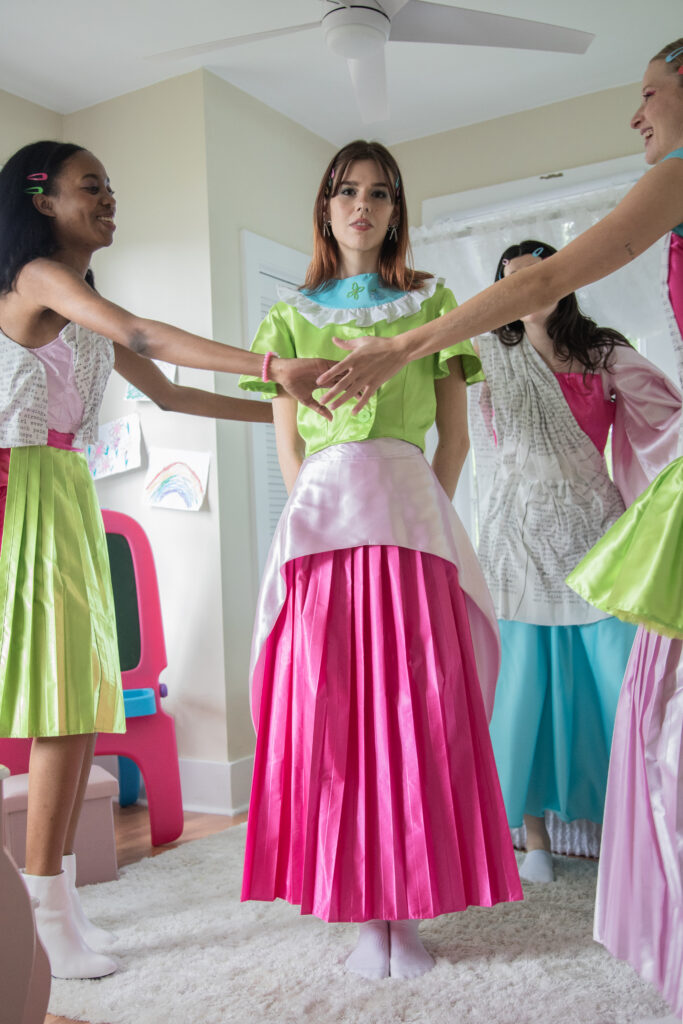
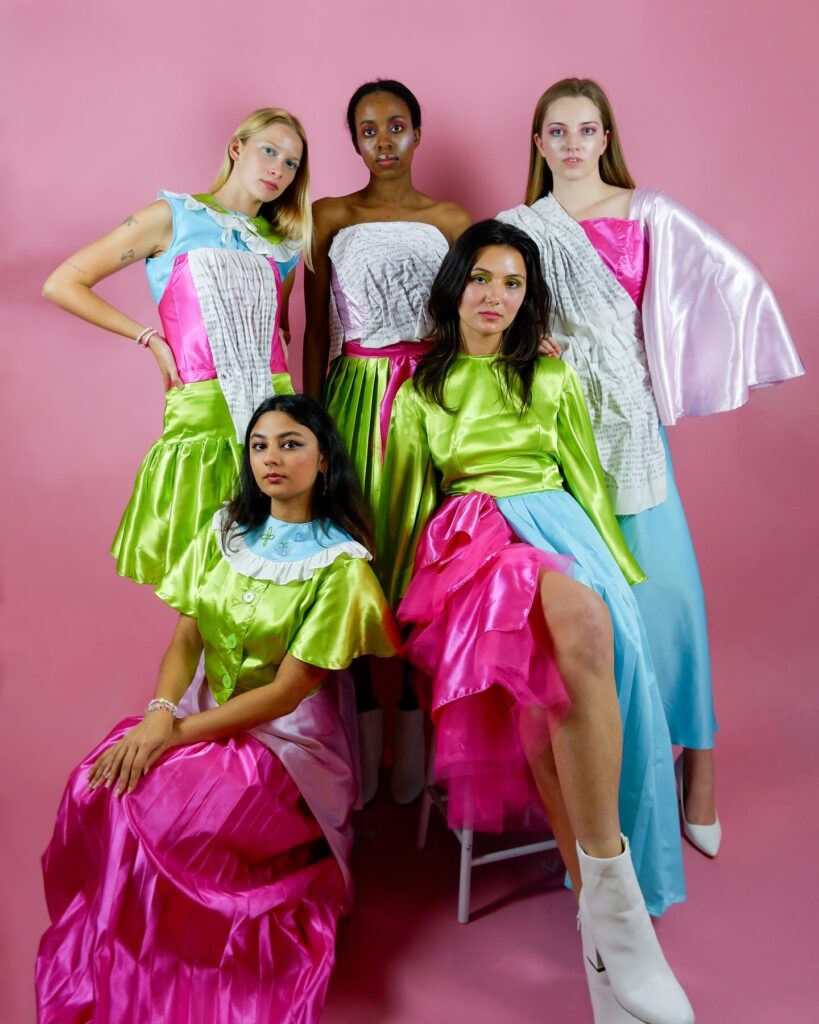
Medina: That’s very cool. Is there anything else that you’re going to take away from this process or that you learned in the past year working on this collection?
Stockard: A few things. One thing is that it doesn’t matter how big or small your collection is. It could be just as impactful regardless of the size or the shape or the color. And there’s always going to be something more that you can add to your collection. You know, I could stick with the same process for the next 10 years, and it would look completely different. But regardless of what I add to it, I’m still satisfied with what I have now and what I’ve accomplished this year alone.
Medina: So for my last question, I’m wondering, what do you think your child-self’s response would be to this collection?
Stockard: “Thank you” is probably a big one. Here’s the reason why: I attempted to try and tell a friend when I was like 10-years-old. And of course, it took me 10 years to even understand what had happened and then accept it. But I was 10 years old, and I still didn’t really understand. And I was too young, I didn’t have any sort of sexual education on it or anything like that. So, I tried to tell my friend, and she laughed in my face. And that was a really hard thing to accept. The fact that I still remember, it hurts. It really hurts. But I know younger me would definitely give me a big hug right now. And the same goes for me, because I love her so much. And I love how far I’ve come and just being able to talk about this. I could say this all day, but it’s a great thing. And even if I’m only making a really small impact, just on the SCAD community, I’ve done my job, and I’m happy. You know, ultimately, it’d be great to let the whole world know. And it’s not until one person speaks up about it that someone else is like, “Oh my gosh, maybe that happened to me.” I definitely think little Jill would be happy for me and just give me a little hug. I’d love to see her. She was so cute.
Special thanks to Jill Stockard for sharing her story and collection with me.
For additional support, survivors of sexual assault can call the National Sexual Assault Hotline at 1-800-656-HOPE or visit RAINN.org
Interview conducted by Flora Medina (@planetflo_)
Photography by Samarah Hutchinson (@samarahhutchinson)
Talent by Jade Pettyjohn, Devon Keeler, Emma Angel, Juliette Hamilton, Amaara Rao, Gracie Jones, and Nina Vara

